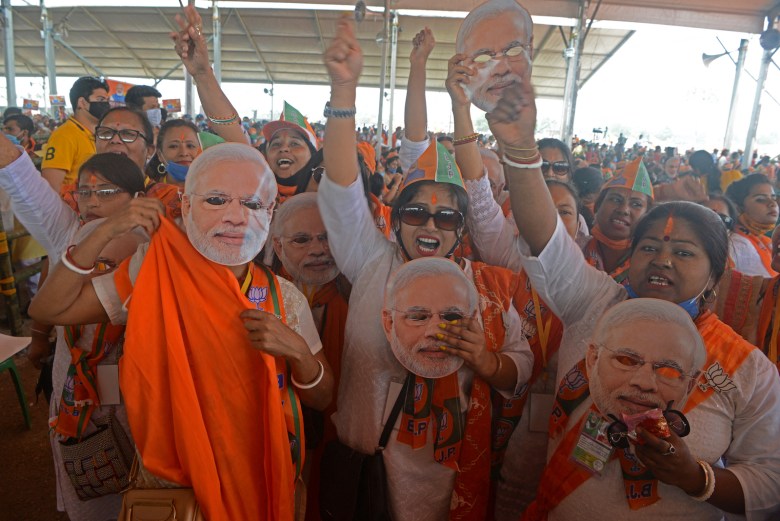JAIPUR – India’s image-conscious Prime Minister Narendra Modi has suffered a plunge in popularity after a second Covid wave hit the country beginning in April. Modi had been riding high with near-80% approval before a series of shocks sent it tumbling.
US data tracking company Morning Consult said his support has dropped to 63%. Indian pollster CVOTER said those “very satisfied” with the prime minister’s performance had fallen to 37% from 65% a year earlier.
It feels that way on the ground too. India’s first wave peaked in September last year with more than 90,000 daily cases but subsided to 15,000 in January.
The second wave came as a shock for everyone and the government by all accounts was caught napping. Ill-equipped health infrastructure made it hard for state governments to provide care for victims.
However, most responsibility lay in the hands of the central government and blame fell squarely on Modi, once the most popular prime minister India had ever seen.
Worst hit were cities such as New Delhi, Mumbai and Bengaluru along with states such as Uttar Pradesh, where the city of Varanasi is situated and from which Modi contests his elections.
News media around the world reported the horror of the way Covid was being handled.

Pictures showed bodies being carried on hand carts and auto-rickshaws, along with people running around shouting for oxygen and beds in hospitals. Poignant images showed the emotions of people losing loved ones.
The Ganges is the holy river for Hindus. Seeing bodies “suspected” to have died of Covid floating on the river and being buried in the sandy banks brought tears and anger all around the country.
Funeral pyres worked overtime as corpses piled up. Crematoriums were busier than ever.
These images hit Modi hard, at home and around the world. His reputation as a strong leader and larger-than-life messiah who could do no wrong seems irreparable. The country’s image took a beating in the process.
Modi and his colleagues have been criticized for holding big election rallies in five states where 187 million people were eligible to vote for 824 seats for a month starting on March 27.
Thousands of people attended rallies. Many of them, including political leaders who spoke to the crowds, were seen without masks or social distancing. This was a big reason behind the surge in cases.
Also, millions of devout Hindus attending the Kumbh Mela pilgrimage in the holy town of Haridwar in Uttrakhand state took part in a festival from January to April. This has been widely criticized for uncontrolled violation of Covid-19 protocols.
Questions remain why Modi and other political leaders did not follow protocols at rallies, why these could not have been held through video conferencing and why there was no check on gatherings at the festival.

Ordinary people have been the victims of the government’s failures and this has been reflected in Modi’s collapsing popularity.
One big question is why the government faltered when there was a gap between the first and second waves.
There were many reasons. Oxygen supply was not properly managed, neither was management in hospitals and vaccinations.
India is the world’s largest producer of vaccines but failed to start inoculations at the right time and in a big way. This was mainly because of poor planning and because its vaccine procurement strategy defied logic.
When most nations were ordering vaccines in the latter half of 2020, India was celebrating victory over Covid.
Modi told a virtual meeting of the World Economic Forum’s Davos Dialogue in late January 2021 that India had controlled the coronavirus by testing and tracking and a proactive public participation approach.
But the country reportedly ordered too few vaccines and the country paid the price of his overconfidence a couple of months later as the horrors of the second wave unfolded.
As of June 24, official figures show more than 30 million people have been found positive, including both waves. More than 29 million have recovered and nearly 400,000 have died. Health experts say these figures are way short of the actual totals, which will be hard to ascertain.

Former Congress Party leader Rahul Gandhi warned in February 2020, “The coronavirus is an extremely serious threat to our people and our economy. My sense is the government is not taking this threat seriously. Timely action is critical.”
He tweeted on April 17, 2021, “We need humility, a clear vaccine strategy and income support to contain this virus and related damage.” He added that government arrogance and suppression of the truth was killing hundreds of thousands of people.
Modi addressed the nation in the first week of June in an emotional speech that some say was meant to improve his sagging popularity.
He said the central government would take over the vaccination drive from June 21 to help ease the crisis because people were not getting vaccines on time. This may be better late than never, but how much it will help Modi restore his image is questionable.
The economy is another major concern for him and his party. India’s gross domestic product (GDP) has taken a sharp dip. The economy shrank by 7.3% over 2020-21, the biggest decline in years. Unemployment is rising and so is inflation.
Modi now has to fight on two fronts – health and economy – as the country goes to the polls in at least seven states in the next eight to ten months. The biggest of these is Uttar Pradesh, which will test Modi’s popularity and set a trend for the 2024 parliament elections.
Anil Sharma is a Jaipur-based veteran journalist and political analyst.


